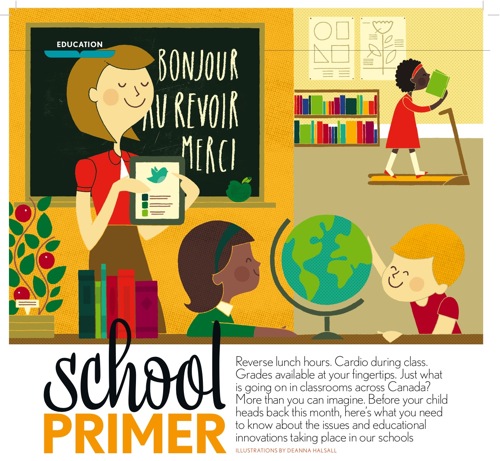School Primer
Should kids under seven ever have homework?
According to the 2006 Homework Realities study, Canadian students spend an average of 32 minutes on homework per night. After surveying more than 1,000 parents, Dr. Linda Cameron and Dr. Lee Bartel, associate professors at the University of Toronto’s Ontario Institute for Studies in Education (OISE), found that while parents like how homework fosters good work habits, it’s very possible to have too much of a good thing. Three-quarters of those surveyed believed their children now have “somewhat” to “much more” homework than they did as children. It also found that 28 percent of Grade 1 students and over 50 percent of Grade 2s spend more than of 20 minutes on homework daily.
That’s too much for Toronto mom of three Emma Waverman, whose daughter did not turn in any of her homework assignments last year, resulting in a stack of untouched Senior Kindergarten French immersion work sheets. “I don’t think five-year-olds learn from doing busy work. I think they learn from doing fun work. Doing homework is a good lesson for older kids, but the motivation to do it has to come from them and their own natural consequences,” she explains.
Ashley Agnew, a Grade 1 teacher in St. Catharines, Ont., does send her pupils home with weekly reading activities to be done with Mom and Dad, as well as the occasional project, but that’s it. “I might ask them to interview a community helper or draw a map of their route to school,” she says. “But they are intended as enrichment activities.”
Arts programs: Why music, dance and theatre make a difference
We all know that when financial times get tough, funding for the arts is often the first on the chopping block. “Some people still see art in education as a frill,” says Dr. Ann Patteson, director of academic research at Learning Through the Arts (LTTA), an initiative which, since its inception, has served thousands of children in hundreds of Canadian schools. As part of The Royal Conservatory of Music, LTTA pairs local artists with teachers in their community to create lessons for unique learning — for example, children studying science will develop a dance that expresses the transformation of solids to a liquid state.
But it’s not just about promoting the arts (not to mention social skills and creativity), a 2002 study out of Queen’s University in Kingston, Ont., found Grade 6 students in LTTA schools scored as much as 11 percentage points higher in math than their peers. It’s no lucky coincidence, says Patteson. “The arts brighten your mind and when your mind is bright, you’re better at other things.”
